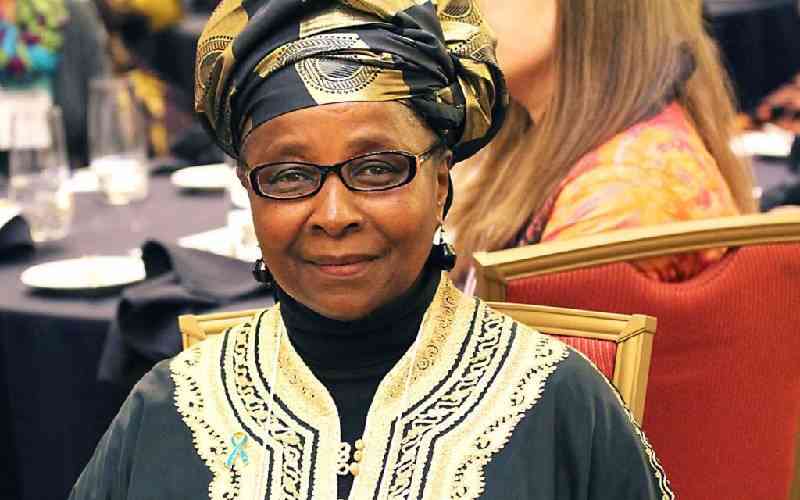
Prof Micere Githae Mugo, the Kenyan scholar and writer who died in the US aged 80, was no doubt a gift to African Art. Born Madeleine Micere Githae in 1942, she was variously a playwright, author, griot, activist, instructor and poet.
A literary critic, she had colourful stints as a literature scholar in a number of universities, including University of Nairobi, and taught African-American Studies at Syracuse University in the US.
For her activism, she was forced into exile in the early 1980s and subsequently stripped of her Kenyan citizenship.
She would flee, first to Zimbabwe, where she applied for and was granted citizenship, and later settled in the US. The late Micere Mugo was vocationally enamoured of - and passionately taught - Orature, Literature and Creative Writing.
Her literary works include six books, a play co-authored with Kenya's foremost man-of-letters, Ngugi wa Thiong'o, titled The Trial of Dedan Kimathi, and three monographs.
She edited journals and helped recalibrate the Zimbabwean school curriculum. In 2002, the East African Standard listed her among the 100 Most Influential People in Kenya at the time.
Literary works
An alumnus of Alliance Girls High School, Makerere University, the University of New Brunswick and the University of Toronto, she won a number of awards for her literary works and excellence in the study of literature, including the Marcus Garvey Award from the Canadian Branch of the Universal Negro Improvement Association and African Communities League in 1985, the Ford Foundation Award for Writing and Publication in 1992, the Distinguished Africanist Scholar Award (2007) and the Royal African Society Lifetime Achievement Award in African Literature (2021).
Her literary works were generally a pastiche of traditional African, Pan-African and feminist perspectives, and drew heavily upon the indigenous African cultural lodestar, zeitgeist and traditions.
While living and teaching in Zimbabwe, she co-edited plays and stories with Zimbabwean writer Shimmer Chinodya and helped translate literary works and text from and into the local Shona language.
The extensive body of her literary output includes the plays The Long Illness of Ex-Chief Kiti (1976), the poems Daughter of My People, Sing (1976) and My Mother's Song and Other Poems (1994); and, literary criticism, Visions of Africa: The Fiction of Chinua Achebe, Margaret Lawrence, Elspeth Huxley and Ngugi wa Thiong'o (1978), African Orature and Human Rights (1990) and The Imperative of Utu/Ubuntu in Africana Scholarship (2021).
Her autobiography, Writing and Speaking from the Heart of My Mind, was published in 2012. Before her expulsion from Kenya, she had been part of the movement - typified by writers and literary scholars Ngugi wa Thiong'o, Owuor Anyumba and Taban lo Liyong in the 1970s - that actively sought the de-Anglicisation of University of Nairobi's Literature Department.
And she had a bee in her bonnet about the primacy - and role - of the African cultural and linguistic identity in the development of African literature.
The late Micere Mugo, like many of our past heroes and heroines, however, was a casualty of our congenital disdain - as a people and society - for "disruptive constructiveness."
The State victimised her for her dissidence, iconoclasm and chutzpah, and fellow writers, literary scholars and historians contributed towards her descent into obscurity by ignoring her ancestral heritage and artistic provenance into oblivion.
Art is important to any society, for it not only enables the preservation of history, but also offers the multi-form portrait of societal generations and the zeitgeist and changes that accompany the passage of time.
Our "strained" relationship with art, typified by our treatment of artists, however, threatens the despoiling of this crucial part of our societal being - individual artfulness.
As Africans, and especially Kenyans, we need to forge a better relationship with art and begin to better appreciate local artists' role in both our individual and national lives.
Building a memorial in the late Micere Mugo's honour, or even naming a major city street after her, for example, would be a good place to start.
 The Standard Group Plc is a multi-media organization with investments in media
platforms spanning newspaper print
operations, television, radio broadcasting, digital and online services. The
Standard Group is recognized as a
leading multi-media house in Kenya with a key influence in matters of national and
international interest.
The Standard Group Plc is a multi-media organization with investments in media
platforms spanning newspaper print
operations, television, radio broadcasting, digital and online services. The
Standard Group is recognized as a
leading multi-media house in Kenya with a key influence in matters of national and
international interest.
